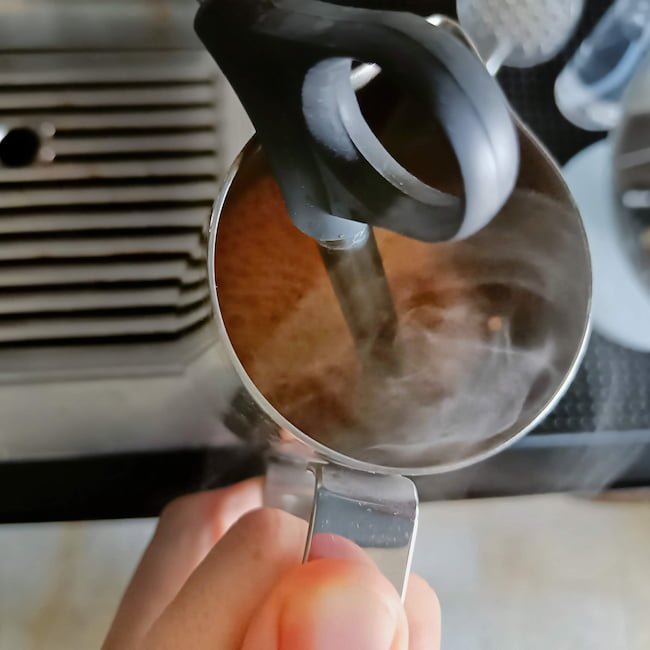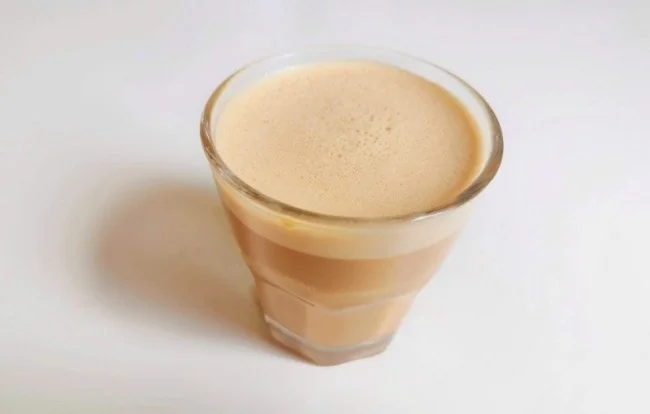Most people react with both curiosity and disgust when they hear the two words butter and coffee uttered in the same phrase for the first time.
Milk is normal. Sugar is understandable. Heck, even a dash of cocoa powder wouldn’t raise any eyebrows.
Butter and coconut oil in coffee, however… at this point, things start to get a bit weird.
However, there is a logical explanation for all the madness.
Personally, I adore so-called “butter coffee” now and then.
If you want to know how you can get in on this exciting trend without sacrificing proper coffee flavor (and your soul), then read on.
Bulletproof coffee vs. coconut oil and butter coffee
It’s been common practice to add dairy to coffee for hundreds of years. Today, we mostly use milk but back in the old school European coffee houses more than a century ago it was pretty standard to add a dash of cream to get that extra rich and round flavor.
Essentially, cream is concentrated milk. And butter is just cream that has been churned. So the step from milk to butter isn’t that dramatic when you think about it.
However, the addition of butter to black coffee wasn’t widespread until entrepreneur and lifestyle guru Dave Asprey came along and shared his recipe on his website in 2009. He called his concoction “Bulletproof coffee” since it was supposed to make you feel bulletproof.
Asprey got the inspiration from the rural people of Tibet who drink yak butter tea – allegedly it’s jam-packed with energy and nutrition.
Why put butter in coffee?
In recent years dietary movements such as paleo and LCHF have preached that fat is actually beneficial to add to your diet if you want to feel good and look fit.
David Asprey has taken this to an extreme with the addition of butter and a derivative of coconut oil called MCT to his morning coffee.
According to him, this combo of caffeine and fat is way better than eating breakfast. It also increases mental clarity and promotes weight loss, the inventor claims.
Many first-movers and health fanatics ended it up giving it a try and found out that the wonder beverage delivered on many of its promises.
However, David Asprey got some backlash in the paleo community for trying to trademark and copyright a rather simple coffee drink.
Mr. Asprey launched his own line of coffee beans and MCT oil that was somehow more ‘bulletproof’ than anything else out there. Notably, his claim that his coffee beans had less “mycotoxins” compared to regular brands was met with skepticism.
Because of this controversy many people have started to call the concoction “butter coffee” instead of using the bulletproof moniker, which can be seen as an endorsement of Mr. Asprey and his business interests.
What is butter coffee?
So if you were to ask me ‘What is butter coffee’? I would say that it’s similar to the abovementioned bulletproof coffee – just without all the marketing and hype.
- In its purest form, it’s just black coffee with butter blended in. No matter, how you make it, however, it’s important to use unsalted butter. Salted butter in coffee is pretty disgusting.
- While milk and cream will easily mix with coffee, butter is more difficult due to its high-fat content. You will need a blender or a hand mixer to get a good consistent result. Or if you have an espresso machine with a powerful steam arm, you can just froth it all together in the pitcher.
- While it’s not strictly necessary, many people like to add coconut oil or its derivative MCT to the concoction. This improves the texture, flavor and health aspects of the drink.
MCT stands for medium chain triglyceride; basically, It’s the medium-long fatty acids from coconut oil. MCT has the benefit of being liquid and flavorless, and some people claim that it’s the most healthy part of coconut oil. However, MCT is usually more expensive than old coconut oil so you might want to try both and find out what works best for you.

My experience: Coconut oil in coffee benefits
I have been drinking butter coffee on and off since I tried it for the first time back in 2013. Back then I was eating breakfast as most people do so it took a few days to get used to replacing the first meal with coffee and fats.
However, after getting used to it, I enjoyed the sensation that the bulletproof butter coffee gave me. One of the ideas behind the drink is that it provides increased mental clarity, and I could feel that in my daily work life. I had more concentration and fewer food cravings. Whether this was due to a slower release of the caffeine or because of the fats, I have no idea. But it seemed to work.
I also found that the drink helped me to adhere closer to a low carb lifestyle, which I was trying to follow at the time. After drinking butter coffee with butter and oil added for around four months and trying to avoid grains, I was back to my lowest weight since high school. It was quite amazing.
View this post on Instagram
The Coffee Chronicler’s verdict
As a coffee geek, there was a downside, however. One of the real pleasures in life is to experience all the flavors a bean has to offer; when you add butter and coconut oil to your mug that’s not going to happen.
I thought that bulletproof coffee was tasting surprisingly good, but it was more like having a latte or cappuccino and less like drinking the kind of black specialty coffee that I’m into. I’d usually drink one cup with butter and then two without, to still be able to enjoy my regular drip coffee.
Also, coffee with butter is similar to milk-based coffee drinks: In general, you should use a slightly darker roast than you would otherwise. The creaminess of the butter lends itself very well to anything from full city to Italian roast. However, don’t go lighter than that.
Today, I usually fast in the morning instead of drinking bulletproof coffee, because it’s easier and seems to offers many of the same benefits.
Once in a while, however, if I have an intense schedule ahead of me, I’ll get the blender out and make myself a delicious and rich butter coffee that will keep me going for hours with sustained energy.
Butter Coffee Recipe / how to make butter coffee
- Brew a large cup of coffee (220 ml/ 7,5 oz)
- Use a darker roast and a method such as Aeropress or pour over. I find the results are more tasty with paper filtered coffee.
- Add 0,5 oz/15 g of coconut or MCT oil to the blender.
- Add 0,5 oz/15 g of unsalted butter. For the best results opt for grass-fed Irish butter such as Kerrygold. Anchor butter from New Zealand is also a decent option.
- Pulse on max speed for 30 seconds or until your happy with the head of foam.
- Pour, enjoy and skip breakfast, if you feel like it.
Top Featured Image: Veganbaking.net | Flickr CC | Source
FAQ
Dave Asprey shared his recipe on his website in 2009. He called this concoction “Bulletproof coffee” since it was supposed to make you feel that way. Asprey got the inspiration from the people of Tibet who view yak butter tea as the healthiest thing you could possibly ingest.
A few people like to blend the oil with coffee in a blender to make a delectable tropical-style drink. Eventually, you can stir your way up to 2 tablespoons (28 grams) of coconut oil in the event that you might want to increase your fat intake. Rundown Start by including 1 tablespoon (14 grams) of coconut oil to your hot espresso.
Butter coffee is believed to give consistent, long-lasting energy without a glucose crash. In principle, since fat eases digestion, the caffeine in the coffee is ingested slower and provides longer-lasting energy.
